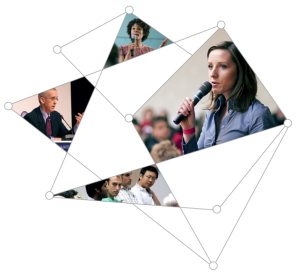16 April 2015
Climate scientists and faith-based groups come together this Earth Day for GreenFaith Day 2015
Posted by Olivia Ambrogio

Climate scientists and religious groups will come together across the U.S. this Earth Day for GreenFaith Day 2015. To learn more, visit the Climate Voices website at climatevoices.org. Photo courtesy of Climate Voices.
By Kristin Wegner
Two-thousand fifteen is a big year: the United Nations Climate Change Conference in Paris this November-December and the Pope’s Encyclical on Ecology this summer are highly anticipated efforts for inciting action on climate change. To mark the importance of these events, climate scientists and faith-based groups will come together in over 80 houses of worship across the country on or around Earth Day for GreenFaith Day 2015.
A wide range of climate science experts, including researchers, state climatologists, and Fulbright students, will volunteer their time to meet with churches, synagogues, mosques, and other faith groups in more than 20 U.S. states to speak on climate change and explore solutions on a local level. These events are sponsored by a partnership between Climate Voices, a collaboration of the United Nations (UN) Foundation and the University Corporation for Atmospheric Research (UCAR), and GreenFaith, an organization that inspires, educates and mobilizes people of diverse religious backgrounds for environmental leadership.
Instead of a formal presentation, scientists are encouraged to be as personal and authentic as possible; it’s a bit of a different twist than most science presentations. The goal is to share the science by making human connections, not data-driven lectures.
Putting away the charts and graphs can be scary for those of us accustomed to academic presentations! To help our speakers prepare to share their personal story of how they came to understand anthropogenic climate change and care about the impacts, we created some guiding questions (Feel free to borrow!):
- Who are you? (Include your academic and personal background)
- What is your current science/research? What attracted you to this field of research? (See Climate Voices Speaker Jennifer Holm’s video that models this)
- What led you to believe that humans are contributing to climate change? (See Climate Voices Illissa Ocko’s video that models this)
- What are the local/regional impacts of climate change in the area you are speaking in?
- Why should we care?
- How can we respond? (Perhaps give one or two personal examples that are encouraging/inspirational to you) (See Climate Voices Speaker John Dwyer’s video that models this)
- (Optional) Feel free to share your personal beliefs/faith/philosophy IF you are comfortable doing so.
Coaching webinar: Climate Voices hosted a webinar by Cassandra Carmichael, the Executive Director of the National Religious Partnership for the Environment, to provide tips and techniques for presenting to the faith community on climate change. The webinar was recorded and uploaded to our site.
We invite you to join our network! Climate Voices, a collaboration of the U N Foundation and UCAR, is a climate science speakers’ network of over 360 participants. We provide coaching webinars, sample slide decks, tools and other resources to our speakers. To join, go to climatevoices.org and click “Become a Speaker.”
Interested in learning more about crafting the climate message to faith-based groups? Explore the following resources:
- Climate Voices online resources
- Climate Change: With Head and Heart Presentation by Katharine Hayhoe (Video)
- GreenFaith’s Our Voices campaign
- GreenFaith’s website
- Interfaith Power & Light
- Faith in place “We give religious people the tools to become good stewards of the earth.”
- Christian evangelical movement: Evangelical Environmental Network
- Christian evangelical movement: World Council of Churches
Kristin Wegner is a project manager for the University Corporation for Atmospheric Research (UCAR). Kristin leads networks of scientists to engage in education and community outreach efforts locally and internationally through Climate Voices (climatevoices.org) and The GLOBE Program (www.globe.gov)










 The Plainspoken Scientist is the science communication blog of AGU’s Sharing Science program. With this blog, we wish to showcase creative and effective science communication via multiple mediums and modes.
The Plainspoken Scientist is the science communication blog of AGU’s Sharing Science program. With this blog, we wish to showcase creative and effective science communication via multiple mediums and modes.
As someone who is extremely interested in science communication and science literacy, I love the idea of focusing on scientist’s personal stories and anecdotes for this events! Too often we are left bored and confused with the endless charts and powerpoints we face as audience members. I hope to see this style of communication gaining more ground in the STEM fields.
-Kristen https://scienceinappalachia.wordpress.com/